| SHADOWS ON THE WALL | REVIEWS | NEWS | FESTIVAL | AWARDS | Q&A | ABOUT | TALKBACK | |||||
 Shadows off the beaten path Shadows off the beaten pathIndies, foreign, docs and shorts...
On this page:
AILEY |
SABAYA |
THE SPARKS BROTHERS
| |||||
| See also: SHADOWS FILM FESTIVAL | Last update 28.Jul.21 | |||||
|
Ailey Review by Rich Cline | 
| |||||
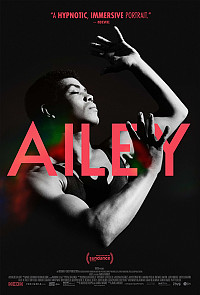 dir Jamila Wignot prd Lauren DeFilippo, Jamila Wignot with Alvin Ailey, Bill T Jones, Judith Jamison, George Faison, Rennie Harris, Carmen de Lavallade, Don Martin, Mary Barnett, Masazumi Chaya, Sarita Allen, Harry Belafonte, Cicily Tyson release US 30.Jul.21 21/US 1h22 SUNDANCE FILM FEST Now streaming... |
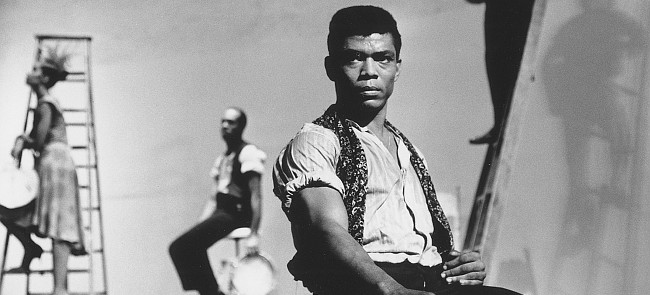 Rhythmically woven together from a variety of sources, this documentary explores how the life and work of the iconic Alvin Ailey is woven into the fabric of American dance over the past half-century. Director Jamila Wignot takes a swirly approach, pulling threads that draw past and present together meaningfully. What emerges is Ailey's power to channel his life through his work to both speak to history and resonate with anyone. After growing up in Texas without a father, followed by his teen years in Los Angeles, 23-year-old dancer Ailey moved to New York in 1954, working with the greats but bursting with his own ideas. Inspired by music and movement from throughout his life, he founded his American Dance Theater in 1958. They toured the world to huge acclaim in the 1960s and 1970s. Then after a mental breakdown in 1980, he continued to push boundaries, developing new projects for nearly a decade before his Aids-related death a month before his 59th birthday. As the film tells Ailey's story, it also follows Harris as he choreographs a powerful tribute piece with a group of gifted young American Dance Theater performers, seeking to explore what made Ailey's work so indelible. Wignot juxtaposes these rehearsal scenes with with astonishingly comprehensive archival clips of Ailey's dancing and his choreography over the decades. Through all of this, Ailey narrates his own story from a range of interviews, while colleagues and fans provide new commentary to-camera, including firsthand memories and current analysis. Ailey's work was naturally expressive, on a political level as he reacted to both his own history and the racism he saw in American society. "Blues, spirituals and gospels are part of who I am," he said, while refusing to be defined as a specifically Black choreographer. The film explores how he guarded his privacy and never spoke about his relationships, channeling feelings into his work. Although Wignot chooses to omit the persecution he suffered from the FBI over his ethnicity, sexuality and political leanings. This is a fascinating look into the mind of a renowned figure whose career ended far too soon. But there's a vivid sense that his drive and intense work ethic came from his troubled childhood in a community that taught him to be ashamed of himself. Clips reveal his warm sense of humour and easy connections with the people around him, as well as his thoughtful approach to cultivating talent. And his legacy is undeniable.
| ||||
|
Sabaya Review by Rich Cline | 
| |||||
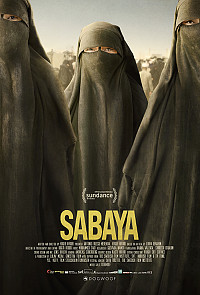 dir-scr Hogir Hirori prd Antonio Russo Merenda, Hogir Hirori with Mahmud, Leila, Mitra, Siham, Zahra, Shadi, Eylol release US 30.Jul.21, UK 20.Aug.21, Swe 19.Nov.21 21/Sweden 1h31 SUNDANCE FILM FEST Now streaming... |
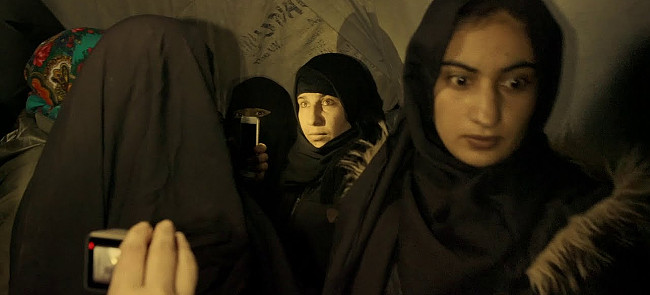 To explore a wrenching aspect of the war in Syria, Kurdish filmmaker Hogir Hirori takes a strikingly observational approach. Avoiding voiceovers and interviews, his cameras dive into harrowing real-life situations. It's beautifully shot and edited, crafting a compelling narrative that makes a huge issue powerfully personal. It also plays as a pointed dramatic thriller starring real-life heroes who will do anything to help women recover their stolen lives. As Daesh is defeated in Syria, its civilians are gathered in camps. Hidden amongst them are thousands of Kurdish Yazidi women and girls who were abducted by Daesh as sabaya, or sex slaves. And many of them are still young girls today. Mahmud and his cohorts secretly head into Syria's dangerous Al-Hol camp under cover of night to rescue them. As Yazidis, Mahmud's team would be killed if discovered. But they persist in their work, even visiting Daesh soldiers in crowded prisons to get leads as they try to locate these women one by one. Mahmoud is contacted by hundreds of families seeking lost wives and daughters, and he works with a group of men and women who bravely infiltrate the camps for information. But Daesh continues to sell these girls between themselves, and many have children fathered by Daesh soldiers. Each mission to find a girl is terrifying, and the cameras put us right in there with Mahmoud. These operations involve tense searches and scary chases across the dark desert, and the film never loses sight of the young girls in peril at the centre of each mission. Hirori contrasts this with scenes of Mahmoud's everyday life with his wife Siham, their lively kids and his mother Zahra. And as they're extracted, these women begin to quietly speak about their horrific ordeals, being continually beaten and raped. Leila was a captive for five years. Kidnapped as a baby, Mitra has experienced things no 7-year-old should. Another speaks about being broken as a little girl. The hardest people to deal with in the camps are women who are still loyal to Daesh and help traffic girls from place to place. The swirling question is how these traumatised young women can return to any kind of normal life. Mahmud and Siham give them time to regroup. Their families want them back, although some heartlessly reject their children. Indeed, these women are deeply scarred, and many opt to become soldiers in the ongoing battle against Daesh. There's also the continual threat of military action from Turks attacking Kurds. But Mahmud is inspiring in his persistence.
| ||||
|
The Sparks Brothers Review by Rich Cline | 
| |||||
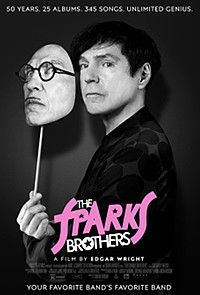 dir Edgar Wright prd George Hencken, Nira Park, Laura Richardson with Ron Mael, Russell Mael, Jane Wiedlin, Alex Kapranos, Todd Rundgren, Giorgio Moroder, Tony Visconti, Muff Winwood, Steve Jones, Nick Rhodes, John Taylor, Vince Clarke, Andy Bell, Flea release US 18.Jun.21, UK 30.Jul.21 21/UK Focus 2h20 SUNDANCE FILM FEST  Now streaming... |
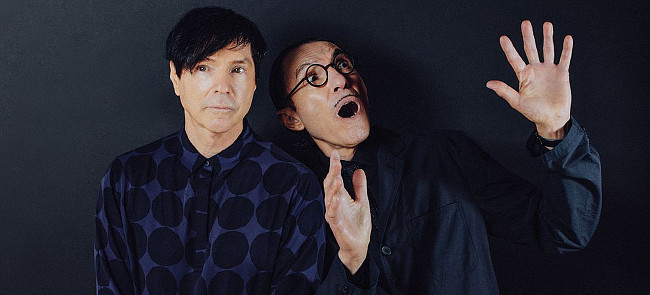 Filmmaker Edgar Wright takes on the documentary form with his usual visual panache, finding witty and inventive ways to explore the career of Ron and Russell Mael. Sparks is a hugely influential but under-appreciated band, and the film highlights how the Maels' refusal to bow to commercial pressure is the real measure of their success. The film is too long, but it's wonderfully engaging, and packed with clever touches. Growing up near the beach in Los Angeles, the Mael brothers soaked up musical influences from all sides, forming a band while at university and gaining record label interest. But while everyone saw their music as pure genius, commercial success has been elusive. Moving back and forth between London and California, they have had occasional huge hits followed by quiet periods over more than 50 years. They never look back, continuing to evolve their sound and pioneer new approaches to pop. And their intelligence and humour set them apart from everyone else. Anchored by hilarious on-screen banter with Ron and Russell, the film features a blinding array of interviews with bandmates, producers, collaborators, fans and musicians who have been inspired by them. Some feel a bit random, such as Jason Schwartzman, Mike Myers and Neil Gaiman, but all of them have salient observations on Sparks' unique career, highlighting favourite songs and performances and generally entering into the lively atmosphere Wright creates for the film. The brothers' story is told chronologically, touching on each album as their style shifts. The key point is that they have never done anything just to please fans, so their work has always been surprising, setting new trends and creating new beats. This also means that waning public interest has pushed them out of the limelight for years at a time. But they come back again and again with something iconic, right up to their recent work with Franz Ferdinand and the Cannes-opening French musical Annette. To set them apart, Wright shoots the interviews in pristine black and white, then stirs in a blinding array of archival footage, live performances, personal snapshots, backstage clips and even some colourful animation. All of this is skilfully woven together into a comprehensive look at Sparks, the music industry, the challenges of artists finding new things to say over five decades, and of course the unusual working dynamic between two brothers. It's the kind of film that makes us want to revisit Sparks' nearly 300 songs and just get lost in them all over again.
| ||||

See also: SHADOWS FILM FESTIVAL © 2021 by Rich Cline, Shadows
on the Wall
HOME | REVIEWS | NEWS | FESTIVAL | AWARDS
| Q&A | ABOUT | TALKBACK | | ||||

